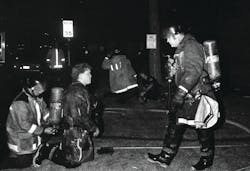My Friends Are You a Prisoner of the Past?
As we once again come to welcome the beginning of a new year, let me suggest that it a good time to pause and take stock of who we are and what we stand for. Let me ask you a simple question. Have you recently encountered any form of opposition to change within your fire department? Perhaps it was a simple change, such as who to order department supplies from or how to fill out a run report, which met with a brick wall. More disconcerting might have been resistance to a major change, such as adding positive-pressure ventilation or Class A foam to your operational bag of tricks.
Regardless of the topic, change is something people not always whole-heartedly embraced by our fellow travelers in the fire service. Resistance to change can be found in the fire chief who fails to understand the need to embrace the incident command system. It can also be seen in those who cling to a stifling management style. Other resistors choose to ignore the use of large-diameter supply hose.
Objections to similar and seemingly obvious changes give me pause to ponder. Given the wide array of scientific research into firefighting operations over the past couple of years, each of our fire departments should be buzzing with the need to embrace the new (and not so new) operational methodology which has been identified and affirmed by those forward-thinking people who have pushed back the boundaries of our knowledge and operational understanding of how to perform our duties.
Many times over the years I have labeled people who are irrationally resistant to change as Prisoners of the Past. Such people have stood as roadblocks to progress in more situations than I care to remember. However, these people need our help and support. They may well be stuck in the past because it is a comfortable refuge from the storms of change. Frankly, change scares some folks.
Let me present a short analogy to illustrate my thought. In the world of fire protection, there are those who see me as a change agent, someone out there in the forefront of the ongoing push for knowledge and improvement within the fire service. However, if you think about me as a person and observe my mode of dress, I am hardly the poster boy for being a change agent.
Heaven knows how often I have been asked to exchange my bow tie for a standard fore-in-hand model or to change my style of eye glasses. I felt no need to indulge any changes to my very comfortable personal image. Like Popeye the Sailor, I am what I am. But it is important to note that being me does not hurt anyone else.
Now what, you might ask, is so bad here? How does my not wanting to change my style of dress relate to a failure to embrace change in a fire department? My choice of music and dress only affects me (and of course my poor long-suffering wife Jackie). However, a failure to embrace necessary organizational and operational changes impacts both the individual member as well as those people with whom that individual works in the fire department.
Stop for a moment and think of the key word in the preceding sentence. It was the word necessary. I have seen people who wished to implement change just because the concept at issue was currently in vogue. Change for the sake of fashion or change in and of itself alone is not necessary change. What I am talking about are changes that have been researched, reviewed and offered as solutions to problems found in the real world; changes which can have a concrete impact on making our work in the fire service safer and more productive.
I am not suggesting that you scrap all of your five-inch hose because of the sudden invention of twelve-inch supply hose. I am suggesting that you review your operation for its level of relevance to current practices. Are you still using 1 ½ inch hose when a slightly larger size can easily increase your fire attack punch? Might your fire department be using 750-gallon/minute pumps because you have always purchased that type? Could it be that you are still supervising your people like an old straw boss in a vintage steel mill? Treating people poorly is never good for an organization.
Let me suggest that you need to review your fire department’s operations on a regular basis. Stay current with the latest trends in fire department operations. Read the trade journals each month. Attend a variety of conferences each year, and most importantly, send your troops out to these events or take them with you. By remaining current, keeping the troops current, and continually assessing your operation, you will be better prepared to make changes when necessary. Also, if you make them a part of the process, your troops will more readily buy in to these changes.
You must work to create a new comfort zone: a zone where the need for change is recognized and embraced. If you are the leader, create an environment receptive to change. If you are the subordinate, perform the duties you are called upon to perform. Study hard and work to move into a leadership position in your organization. Let me close with a bit of wisdom for you to ponder. It is in the form of a short prayer.
Lord, grant me the strength to change those things which I can; the serenity to accept those things which I cannot change, and the wisdom to know the difference.
Do not be the Prisoner of the past. Do not ridicule the Prisoner of the Past. Let me remind you that rehabilitation can do wonders.
